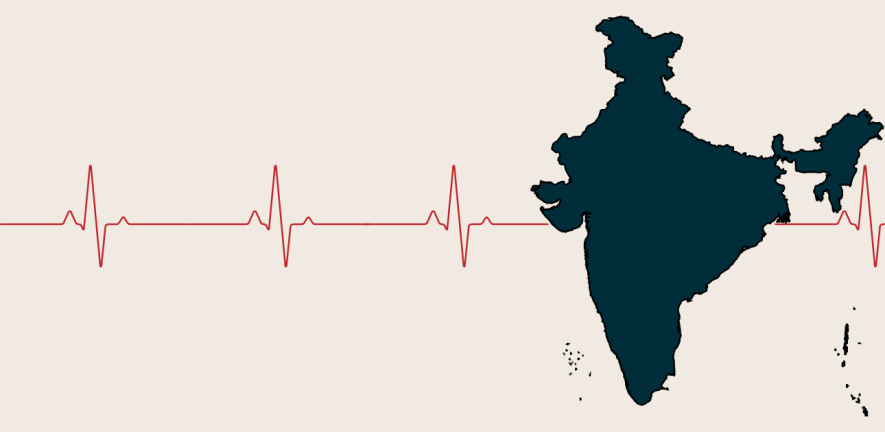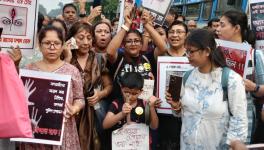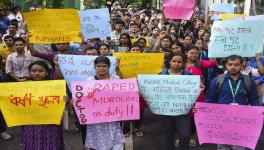Why India Urgently Needs a Union Law to Protect Healthcare Workers

Image Credit: The Leaflet
The Union government’s stance, reiterated recently, that there is no need for a specific Union law to protect healthcare workers— citing that 26 states and Union territories have already enacted legislation for the purpose— belies the ground reality.
State-specific laws suffer from inconsistent application and weak enforcement. According to an analysis by Deccan Herald, states such as Karnataka, West Bengal and Tamil Nadu do not extend legal protections to ‘auxiliary nurse midwives’ (ANMs), ancillary workers, and health visitors— roles critical to the healthcare system, especially in rural areas. This leaves these workers vulnerable, without legal recourse in the event of violence.
Further complicating the issue, only Goa has adopted provisions for graded penalties, which allow for punishments to be proportionate to the severity of the crime.
In contrast, the absence of such provisions in other states weakens the law’s deterrent effect, either by failing to properly address minor offences or by imposing disproportionately harsh penalties for less severe crimes.
Moreover, only Uttarakhand includes specific provisions for repeat offenders, meaning that most states allow individuals who repeatedly commit violence against healthcare workers to evade escalating consequences.
Additionally, in Bihar, offences against healthcare workers are compoundable, meaning they can be settled out of court. This undermines the severity of these crimes and allows offenders to escape stringent punishment.
These disparities create a confusing and inadequate legal landscape, where healthcare workers in states such as Goa or Uttarakhand might enjoy stronger protections than those in West Bengal or Karnataka, leading to unequal standards of safety and justice.
Also read: An analysis of how ill-managed the Covid pandemic was in India
Enforcement is another major challenge. Many police officers are unaware of the specific state laws protecting healthcare workers or unsure how to enforce them.
According to Dr Neeraj Nagpal, convener and managing trustee of the Medicos Legal Action Group in Chandigarh, “Without any provision in the Indian Penal Code (IPC), filing a case can sometimes mean taking a copy of the Act to the police because she or he may not even know about it.”
Dr Nagpal further explains that the “police may not even be sure under which Section to file such a case, highlighting the enforcement gaps that leave healthcare workers vulnerable.”
These failures are not just theoretical; they have real and dangerous consequences. The Indian Medical Association (IMA) estimates that 75 percent of doctors have encountered violence in their careers.
A plea filed by the Association of Healthcare Providers (India), Tamil Nadu chapter and Dr B. Kannan in the Supreme Court stated that not even 10 percent of cases registered under state laws against culprits reached the courts after a chargesheet was filed.
A study conducted at New Delhi’s Ram Manohar Lohia Hospital found that only 20 percent of cases were referred to the police, and none resulted in punishment for the perpetrators.
In Karnataka, a 2018 report by the Karnataka Law Commission revealed that between 2010 and 2017, only 173 cases were registered, with a mere 23 going to trial and only three resulting in convictions.
No cases awarded compensation to victims— a clear sign of the law’s ineffectiveness. These findings demonstrate that existing laws have failed to prevent attacks on healthcare workers.
Despite these realities, the Union government has been reluctant to enact a law. Previously, in 2019, the Healthcare Services Personnel and Clinical Establishments (Prohibition of Violence and Damage to Property) Bill was introduced to create a dedicated legal framework to protect healthcare workers.
Also read: R.G. Kar murder and rape case: SC issues slew of directions, some missing from the written Order
However, this effort was shelved, as it was argued that these protections could be better implemented under the Epidemic Diseases Act (EDA), 1897 during the COVID-19 pandemic.
The Union home ministry had also expressed its “concerns that similar protections might be demanded by other professional communities”.
This reasoning was extended in 2022 when the Prevention of Violence Against Healthcare Professionals and Clinical Establishments Bill was introduced in the Lok Sabha, only to be shelved again with the argument that its objectives were covered by the Epidemic Diseases (Amendment) Ordinance, 2020.
This reliance on the EDA is problematic. The EDA’s provisions are tied to specific health emergencies and include a sunset clause, meaning the protections are temporary and will lapse after the pandemic ends. Limiting the protection of healthcare workers to such a narrow context fails to address the ongoing, systemic violence that they face.
However, a Union law could overcome these issues by integrating itself with the recently enacted Bharatiya Nyaya Sanhita (BNS) that has replaced the IPC. This integration could ensure that protections for healthcare workers are embedded in a more permanent, uniform and widely recognised legal framework, addressing the enforcement challenges that have plagued state laws in the past.
It is ironic that the Bharatiya Janata Party (BJP), a party often obsessed with uniformity— whether it is the ‘Uniform Civil Code’, ‘One Nation, One Poll’, or other centralising policies— hesitates to apply the same logic to safeguarding those who risk their lives for public health.
The need for a Union law is clear and urgent. It is not just about filling the gaps left by state laws, but about affirming a national commitment to the safety and dignity of all healthcare workers.
The government must act decisively, enacting a Union law that will protect healthcare workers across India, ensuring that they can continue their vital work without fear or hesitation.
Jehosh Paul is a lawyer and research consultant. He holds an LLM in Law and Development from Azim Premji University, Bengaluru. The views are personal.
Courtesy: The Leaflet
Get the latest reports & analysis with people's perspective on Protests, movements & deep analytical videos, discussions of the current affairs in your Telegram app. Subscribe to NewsClick's Telegram channel & get Real-Time updates on stories, as they get published on our website.
























